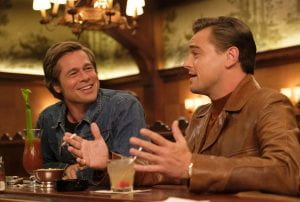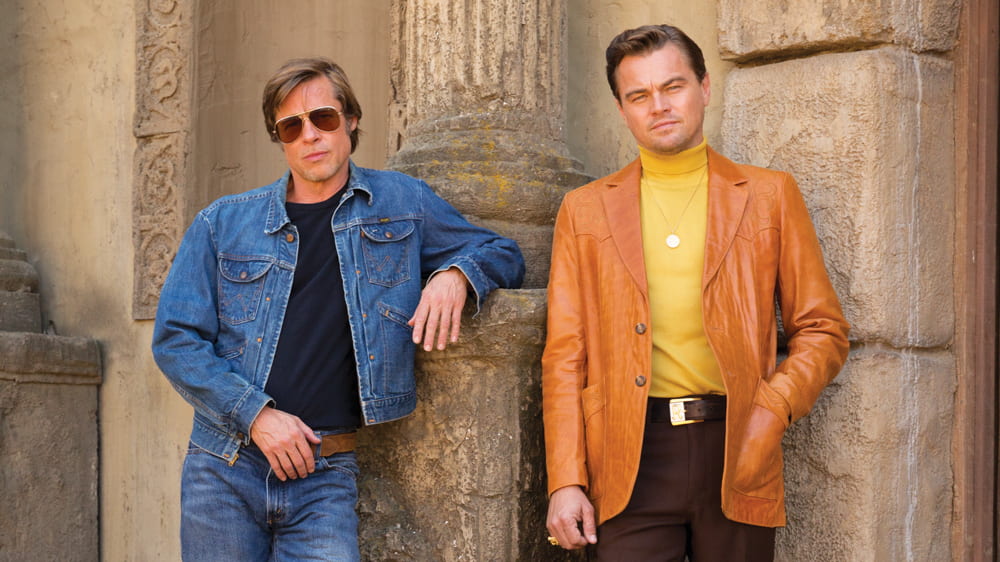Everyone and their mother loves Ocean’s Eleven. It stands tall to this day, almost two decades after its initial release, as one of the great heist movies in the history of cinema, and is essentially universally regarded as such. Held together by one of the most astoundingly talented ensemble casts in all of modern cinema, the chemistry and wit of the famous Eleven launches the film toward stratospheric levels of fun, paired with an extremely clever and engaging heist narrative. Continue reading “Retrospective: ‘Ocean’s Twelve’: The Most Fun a Movie’s Ever Been”
Review: ‘Ad Astra’ is a Journey Deep Into Space and the Soul
“Ah, but a man’s reach should exceed his grasp,
Or what’s a heaven for?” – Robert Browning
Exploration — whether into the vast expanse beyond our atmosphere or simply deep into Earth’s own uncharted territories — has become one of the most identifiable aspects of humankind over its short history. In modern times, it is done to reach beyond our understanding of the world or universe and our place within them, to discover that which we were previously unaware of in order to expand the reaches of human knowledge, or perhaps to conquer the universe as much as we can. Stories of exploration are abundant throughout the history of cinema, from Georges Méliès’ A Trip to the Moon all the way back in 1902 to countless sci-fi epics and action-adventure films, and Ad Astra is no exception.
James Gray, director of Ad Astra, is no stranger to stories of exploration. In 2016 he released his film The Lost City of Z, a recounting of the journeys of early 20th century explorer Percy Fawcett deep into the Amazon jungle in search of a hidden city of gold and unimaginable treasures. Although largely overlooked by many and passed on by every major award ceremony, the film garnered great critical success and is soundly among the better films released this decade. It was a deep examination into the outward and inward motivations for journeying into the unknown, a theme that Gray would dive even deeper into in Ad Astra.

Set sometime in the near future, the story follows a fearless astronaut named Major Roy McBride (Brad Pitt), a taciturn and austere individual and son of legendary astronaut H. Clifford McBride (Tommy Lee Jones). Following an incident in which a massive and mysterious power surge nearly kills him and sweeps across the planet, McBride is informed that the surges originate from the Lima Project, a previous mission with the intent of finding extraterrestrial life helmed by his father, from which nothing had been heard from in sixteen years. Informed that his father may still be alive, McBride accepts a mission to Mars and beyond with the intent of communicating with the Lima Project and uncovering the truth about the dangerous surges that threaten life on Earth — and to find his father.
Although it is filled with intermittent bursts of effervescence — especially a Mad Max-like moon battle on wheels — the film is much more concerned with taking its time to flesh out the psychological complexities of the stoic Roy McBride, and the shock to his system that his mission becomes. Roy sees his father as the legend and the hero that all astronauts perhaps ought to be seen as, and thus has modeled his entire life and being after the man. He is not only a lauded astronaut famous for his cool-headedness in the face of great danger, but he has crafted himself a shell through which he blocks his very self from existing in hopes of subconsciously eliminating his connection to his own and others’ emotions. In truth, he is terrified of opening himself up to others, and as a result he subconsciously destroys his sparse personal relationships out of pure unresponsiveness and rigidity. While his coldness is what makes him so excellent at his job, and such an asset to the government agency for which he serves, his unflinching exterior is in conflict with the cacophonous ocean of thoughts that roar in his head throughout the film. Gray makes use of repeated Malick-esque voice-over narration from McBride to emphasize the tumult of his psyche, as he struggles more and more to remove all vulnerabilities from himself as he delves deeper into his journey. Here, DP Hoyte van Hoytema’s intimate close-ups paired with Max Richter’s tremulous score complement Pitt’s restrained despair excellently, often holding for longer than expected on scenes with McBride alone in order to allow the audience to gain an incredible deep understanding of the character, even in moments of silence.

As the film goes deeper and deeper into the infinite, focus grows more and more intimate. Gray begins to hone in on the motivations for men taking off into the stars with a tight and uncompromising precision, asking if perhaps the men who go off to the stars for the sake of mankind are actually going to escape something, maybe even themselves. Beyond this, the film shows that for all of us hoping to continue running from that which we are afraid to reckon with, at some point there will be nowhere left to run. In McBride’s case, the film examines his own fears and startling realizations more deeply, as he grows more and more at odds with his seemingly inevitable fate of turning into his father, the man he once revered as a near God-like figure. In this sense, the film’s approach towards McBride’s voyage to find his God feels almost misotheistic, perhaps suggesting in this case that God is not dead, but that he has simply abandoned us.
Films like Ad Astra are diamonds in the rough. Rarely do deeply contemplative psychological examinations as good as this one get slapped with $90 million budgets and the full IMAX treatment, let alone even get made by a big studio at all. Modern masterpieces like this don’t come around too often.
5/5 STARS
Review: ‘Once Upon a Time in Hollywood’ May As Well Be Tarantino’s Swan Song
Quentin Tarantino is a filmmaker, yes, but he is first and foremost a film fanatic – each release of his paying respect to the stories that made him fall in love with the medium. Whether that be through overt genre homages or obscure references stealthily positioned into his dialogue, he wears his influences on his sleeve with pride. In Once Upon a Time In Hollywood, he cranks that dial up to 11, creating a film that not only operates as a swan song to an era gone by but as a vehicle for him to vent his own frustrations while living vicariously through the lead characters. For that, it’s easily one of his most personal films to date.

This notion is no more apparent than in a scene shared between Rick Dalton (Leonardo DiCaprio) and the young Trudi (Julia Butters). The two, seated side by side in between shooting their scenes on the TV show “Lancer,” strike up a conversation about their reading material. Trudi, giving a synopsis of her Walt Disney biography, declares him a genius – the type of guy that’s “one-in-a-million.” Dalton, on the other hand, recounts the story of a middle-aged cowboy that’s lost his touch – one that parallels his own state at that point in the film – and drives himself to tears. It’s an “in your face” analogy of Old Hollywood vs. New Hollywood, but it’s effective at telling it as it is: Hollywood, for better or worse, isn’t the same as it once was, and the younger generations don’t gravitate towards the same types of stories. And the inclusion of Walt Disney wasn’t unintentional either – Tarantino has explicitly expressed disdain against the company, and it’s ironically fitting that Once Upon a Time in Hollywood debuted at the box office the same weekend as the live-action reboot of The Lion King, where it earned the #2 spot against the Disney juggernaut. Tarantino is clearly frustrated by classic film’s waning relevance, but that’s not to say the film carries a resentful tone. What Once Upon a Time in Hollywood is, is unabashed and bittersweet – it longs for the days of old while being fearless in its execution.

And longing this film is, with extended scenes of characters driving, walking, and simply being, set in the lush but lived-in 1960s Hollywood. On a cursory level, the intent behind such a decision on Tarantino’s part may be to simply show off the beautiful production design (which is genuinely astounding), but it’s also maybe an attempt to grasp onto the last remains of a dying breed of film, and to be in the moment with all its authenticity. The Sharon Tate theater scene is a perfect reflection of this, and also a heartbreaking reminder of fame’s fleeting nature. It’s off-putting to even think a film this mature, grounded, and free-flowing came from Tarantino, but at the same time, it’s a story so inherently intertwined within his own journey as a filmmaker that I can’t imagine anyone else making this. That in itself is a testament to his raw talent and legacy behind the camera.
I could say that while satisfying, the ending felt comparatively abrupt versus the consistently steady pace held by the rest of the film, and that I wish Sharon Tate, though treated with much respect under the circumstances, was more developed. At the end of the day, though, I would rather watch an audacious film over a safer film – flaws and all. Let’s treasure those films while we can.
3.75/5 STARS
UW Film Club Podcast #45 – Once Upon a Time in Hollywood
“Hey! You’re Rick ‘The Podcaster’ Dalton, don’t you forget it.”
Keeping in the summer movie spirit, we’ve decided to cover one of the most anticipated films from one of the most revered, yet controversial, filmmakers – Quentin Tarantino’s Once Upon a Time in Hollywood! His newest film involve the lives of a fading television actor and his stunt double as they navigate 1960s era Hollywood. In this podcast, we talk about this film in the context of Tarantino’s entire career, how it pays homage to Sharon Tate, and we have a couple disagreements over the film’s ending. Is this one of the legendary director’s best works? Find out now on the 45th episode of the UW Film Club Podcast!
On this episode: Cynthia Li and Jim Saunders.
You can find us on Facebook at /UWFilmClub, and on Twitter and Instagram @FilmClubUW. Make sure to rate, comment, and subscribe to our podcast on Apple Podcasts, Soundcloud, Spotify, and Google Play, and tune in every Monday for a new episode of the UW Film Club Podcast!



